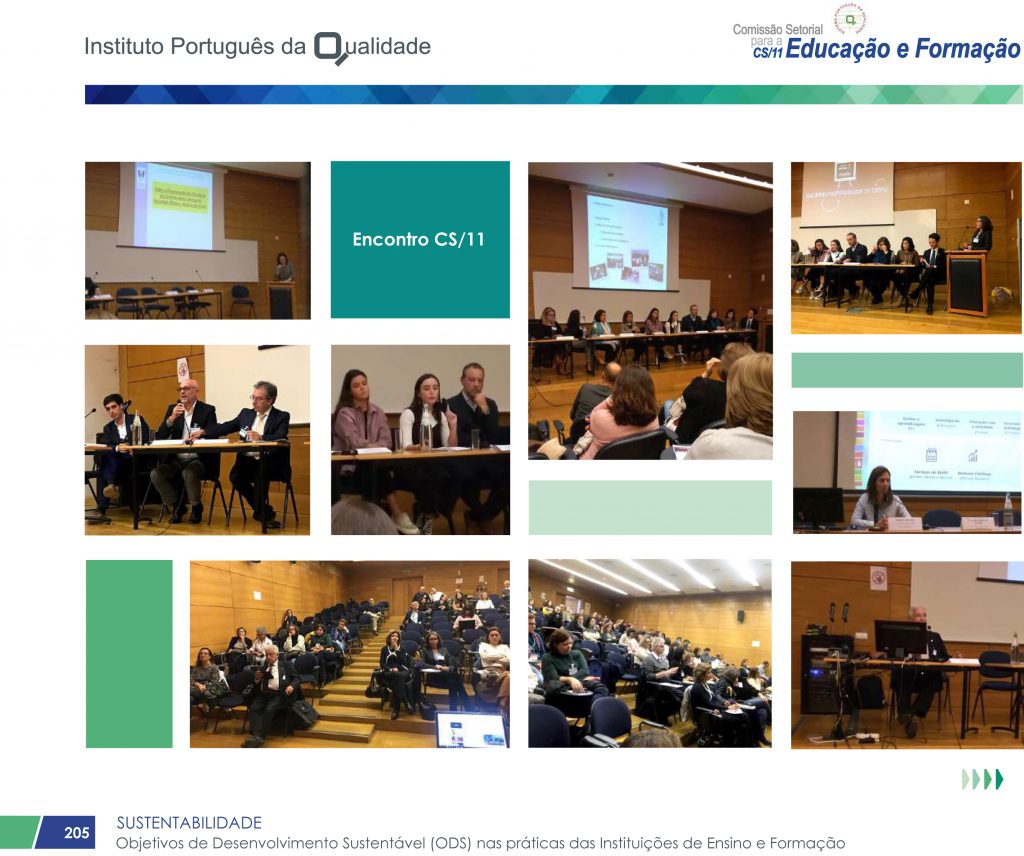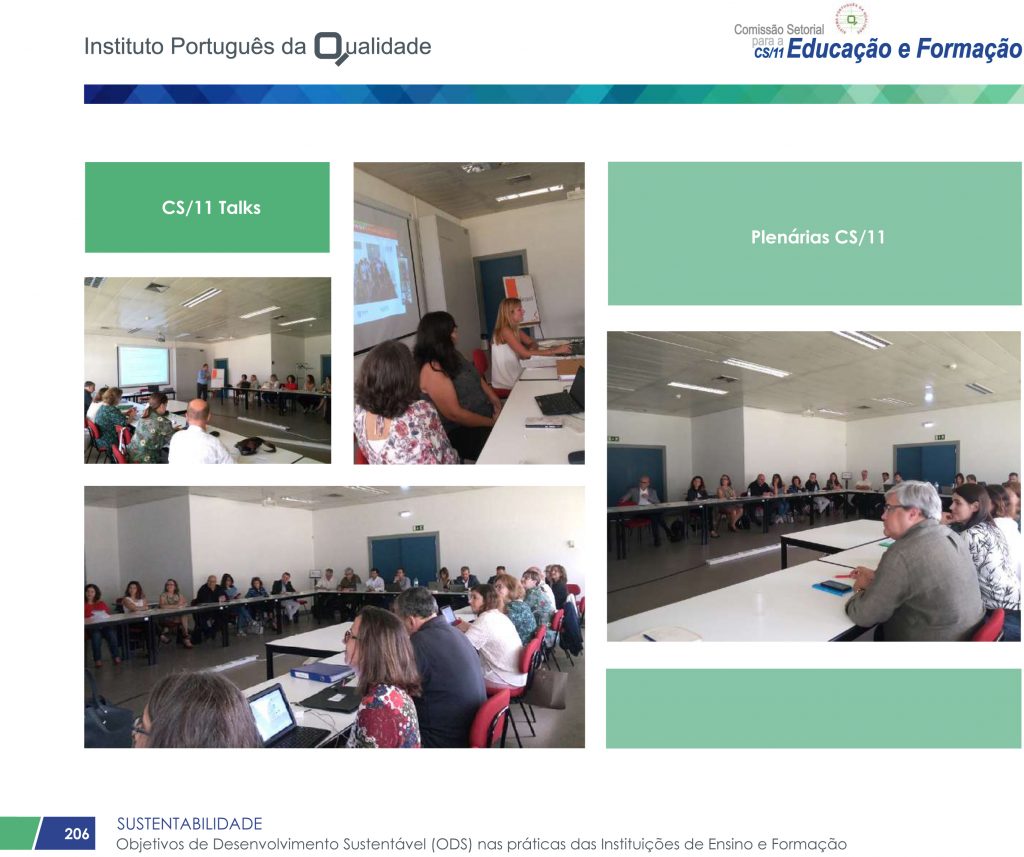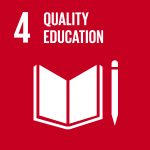Partnerships for SDG integration in Education Institutions: Evidence from the Sectoral Committee for Education and Training (CS/11)
Description
Institution
Sectoral Committee for Education and Training

Organizations/areas of the university involved
Universidade Aberta; Universidade Católica; Universidade da Beira Interior; Universidade da Madeira, Universidade de Aveiro; Universidade de Coimbra; Universidade de Lisboa – Faculdade de Letras; Universidade do Algarve; Universidade do Minho; Universidade do Porto; Universidade Lusófona; UNL – Universidade Nova de Lisboa; UTAD – Universidade de Trás-os-Montes e Alto Douro;Instituto Piaget; IPCoimbra – Instituto Politécnico de Coimbra; IPLeiria – Instituto Politécnico de Leiria; IPPortalegre – Instituto Politécnico de Portalegre; IPPorto – Instituto Politécnico do Porto; IPQ – Instituto Português da Qualidade; IPSetúbal – Instituto Politécnico de Setúbal; IPTomar – Instituto Politécnico de Tomar; IPVC – Instituto Politécnico de Viana do Castelo; ISCPSI – Instituto Superior de Ciências Policiais e Segurança Interna; ISCTE-IUL – Instituto Universitário de Lisboa; ISEG – Instituto Superior de Economia e Gestão; ISEL – Instituto Superior de Engenharia de Lisboa; ISQ – Instituto de Soldadura e Qualidade; IST – Instituto Superior Técnico;Egas Moniz – Cooperativa de Ensino Superior, C.R.L.; Escola Superior de Educação de Paula Frassinetti; Escola Superior de Saúde de Santa Maria; Escola Universitária Vasco da Gama; ESEnf – Escola Superior de Enfermagem de Coimbra; CNE – Conselho Nacional de Educação; APESP – Associação Portuguesa de Ensino Superior Privado; APQ – Associação Portuguesa para a Qualidade;A3ES – Agência de Avaliação e Acreditação do Ensino Superior;
Country
portugal
This practice describes the recent work of the Sectoral Committee for Education and Training (CS / 11) namely the work of GT1 – Working Group for SDG integration in Education and Training Institutions (ETI) sharing information and experiences on a voluntary basis building partnerships through collaborative benchmarking processes.
CS / 11 develops collaborative benchmarking practices operationalized in monthly meetings, where integration of SDG in Education and Training Institutions is discussed and best practices are shared. With the involvement of 34 Portuguese Higher Education Institutions (HEI), 7 Training Institutions (TI), 7 Representative associations from different areas (parents, teachers, school board directors) and 5 public agencies or regulators, CS / 11 worked in the last two years in a collaborative way, sharing information among its members and with the whole community on the topic of Sustainability in Education and Training and the integration of the SDGs in Education and Training Institutions. In its plan for the 2019-2021 triennium, CS / 11 set itself the objective of working on the implementation of the SDGs in Education and Training aware that the focus of this sector should be on SDGs No. 4 and No. 17, the first as a guarantee of an inclusive, equitable and of quality, which lasts throughout life; the second because of the imperative to solve the problems our society faces in a network of IEF available to develop collaborative benchmarking practices, discussing the integration of SDG in Education and Training Institutions and sharing best practices.
The theme of the SDGs was thus constituted as an instrument for the joint work of the entire educational building, opening doors to a non-existent collaboration, to date. In this sense, it was important to find a project that would put the various sectors of education and training to work together, based exactly on the SDGs.
Results and impact measured or expected
In accordance with the pre-established mission for the CS / 11, in 2021 The Sectoral Commission for Education and Training (CS / 11) – promoted by the Portuguese Quality Institute – developed the e-book “Sustainability – Sustainable Development Goals (SDGs) in the practices of Education and Training Institutions “whose OBJECTIVE is to Identify and disseminate Good Practices of Education and Training Institutions that contribute, positively and efficiently, to the fulfillment of the SDGs, to the promotion of Quality and to enhance the continuous improvement of teaching . This work was drafted on a voluntary basis by the representatives of the Institutions that make up CS / 11 and was developed within the scope of the Action Plan (2019-2021) of this Committee, with the support of IPQ.The e-book is available on the website of the Portuguese Quality Institute (IPQ) – on the page dedicated to CS / 11 and is freely accessible. We want this Ebook to be a dynamic document with periodic upgrading based on new experiences and contributions, sharing good practices with partners and society in general spreading the information in the academic and scientific communities.
Creation of the 2021 working group that will publish a new edition of the ebook, not only with good practices but also with forms that describe the way in which each IEF represented is implementing the SDGs in the institution sharing good practices with partners and society in general spreading the information in the academic and scientific communities.
Connection with the SDG framework
Education and Training institutions (ETI), due to their role of disseminating knowledge and their relevance in society, are called to develop a more dynamic action in the fulfillment of the SDGs. In return, assuming an explicit commitment, the ETI have the opportunity to show their impact on society, to incorporate the SDG themes into their training, create new partnerships, find new sources of financing, and give visibility to their commitment to the 2030 Agenda. What is being asked is for Education to take a leading role in the process of generalizing and integrating the SDGs into society. The Education Sector, for its characteristics and, in particular, for its independence and freedom, is one of the few that is still in a position to lead this process (although there may already be conflicts of interest).
The education space should be characterized by:
-Freedom
-Critical spirit
-Democracy
Barriers and follow up
The main barrier that we encountered was the lack of time of our members because of the permanent challenges they face, once almost all of them have connection and active participation in European Projects and community actions. Another important question is the transversality demand when we speak about SGD which for some organizations is still a problem.
Transferability of the initiative
This initiative is being updated, once the Committee wants to gather information from other ETI and measure the evolution of last year work on the SGD field. The common knowledge of what each of the institutions is doing and the innovation of some projects reflects the transferability of the initiative. Our work in progress on GT1 allied with two more Thematic Groups on Quality Managements Systems and on Quality Teaching, are strong factors that allow us to guarantee the transferability of any results. An important issue is the fact that we cover all our country.
Education 4 SDG funciona gracias a WordPress


